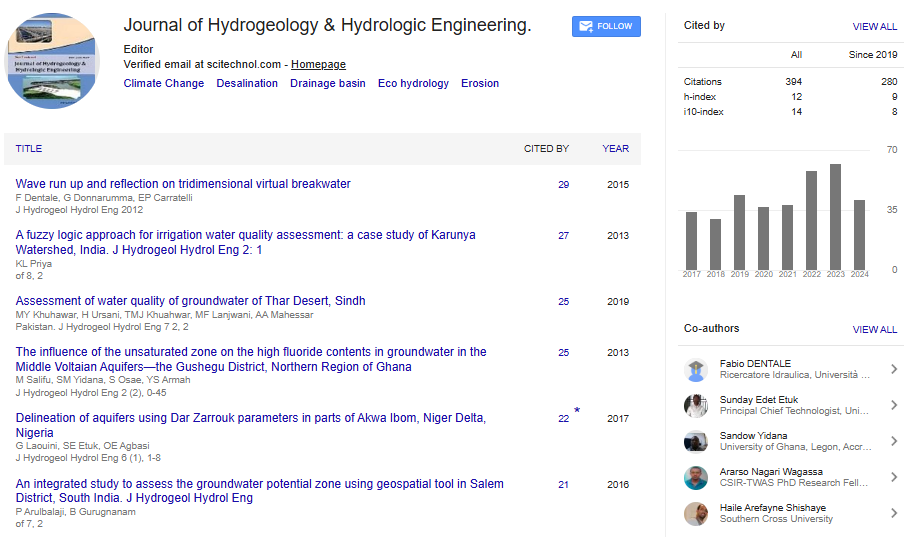Research Article, J Hydrogeol Hydrol Eng Vol: 7 Issue: 1
Vertical Electrical Sounding Survey for Groundwater Exploration for Rural Water Supply in Parts of Ketu South in the Volta Region of Ghana
Patrick Adadzi1*, Harrison Coffie2, Emmanuel Afetorgbor1 and Mohammed Takase3
1Department of Civil Engineering, Faculty of Engineering, Ho Technical University, Ho, Ghana
2Department of Building Technology, Faculty of Built Environment, Ho Technical University, Ho, Ghana
3Department of Environmental Science, School of Biological Sciences, University of Cape Coast, Cape Coast, Ghana
*Corresponding Author : P. Adadzi
Department of Civil Engineering, Faculty of Engineering, Ho Technical University, Ho, Ghana
Tel: +233245142414
E-mail: pcadadzi@gmail.com
Received: May 05, 2018 Accepted: May 21, 2018 Published: May 28, 2018
Citation: Adadzi P, Coffie H, Afetorgbor E, Takase M (2018) Vertical Electrical Sounding Survey for Groundwater Exploration for Rural Water Supply in Parts of Ketu South in the Volta Region of Ghana. J Hydrogeol Hydrol Eng 7:1. doi: 10.4172/2325-9647.1000163
Abstract
Hydrogeological investigations and geophysical surveys are important methods in many subsurface characterization studies. This work examines the importance of geophysical surveys in the construction and development of boreholes to provide portable drinking water to rural communities. The paper discusses the interpretation of subsurface features that can be used to assist in the evaluation of groundwater resources in a typical rural area. Lack of infrastructure in these areas is a constraint on borehole drilling due to limited subsurface data availability. Vertical Electrical Sounding (VES) stations were established to investigate the subsurface geology and aquifer potentials in the study area. VES technique was performed by measuring the resistivity change with depth. The resistivity
measurements were conducted using ABEM SAS 100C Terrameter by using Schlumberger electrode configuration. The hydrogeological information obtained by the methods discussed in this paper can be used as estimates of the depth of groundwater, aquifer geology, and recharge and discharge zones. The objective of the study was to provide guidelines with sufficient data and information to evaluate borehole options and future borehole drilling and development campaigns in typical rural settings.
 Spanish
Spanish  Chinese
Chinese  Russian
Russian  German
German  French
French  Japanese
Japanese  Portuguese
Portuguese  Hindi
Hindi 
